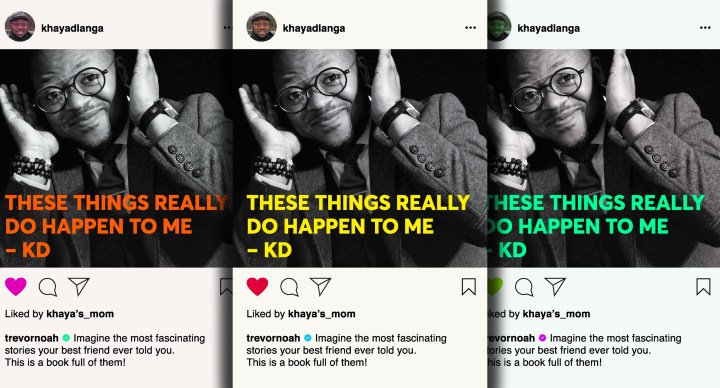BOOK EXTRACT
These Things Really Do Happen To Me

In These Things Really Do Happen To Me, Khaya Dlanga describes everyday experiences that have shaped his life. In this extract, he asks in the chapter heading: Why is the system designed to deprive me for being born into poverty?
In 2017, I was invited by the young and charismatic Mark Sham to speak as one of four speakers at his Suits and Sneakers event.
The other speakers were Dr Adriana Marais (a quantum biologist who has been shortlisted as one of the people who will fly to Mars — not to return), Ran Neu-Ner (the co-founder of The Creative Counsel, an agency that was sold for a billion rand — before Ran was 40 years old), and Cal Fussman (Writer at Large for Esquire magazine, known for the What I’ve Learned column).
Then there was me. I felt terribly inadequate. As if that wasn’t bad enough, when I got to the Sandton Convention Centre for my talk, I realised that I had completely misheard Mark when he’d said there would be an audience of 300. I was off by another whole zero. There were 3,000 people.
When I got up to speak, Dr Adriana Marais had already spoken and so had Ran Neu-Ner. My talk focused on the philosophy of “first show you can and then ask”. When you’ve asked for help, people often want to see that you can do what you say you can before they help you.
You can’t say, “I am passionate about playing the guitar,” if you have never learnt anything about the instrument. If you can’t afford a guitar, you could still try to make one with a tin can, for example.
These things really do happen to me
I used the example of the CV that got me my first job in advertising. I’d had money troubles and had to drop out of college, meaning that I’d left the AAA School of Advertising without any qualification. But since I still loved advertising and wanted to get into the industry, I took a chance and applied for a job at Lowe Bull Calvert Pace — one of the most creative advertising agencies in Cape Town at the time.
Everyone wanted to work there.
This is what my CV said:
Khaya Dlanga’s CV …I live in Pinelands, not Gugulethu …I can use phones, faxes and computers without breaking them …Some of my best friends are white …I can swim (when it’s absolutely necessary) …I am not a member of Cosatu Position applying for: Copywriter …I used to write slogans on township walls like, “Free Mandela” and “One man one vote”.
This was a very successful campaign, as you might have noticed. I got the job. It was around this point in my speech that I started to talk about how many black children, even those with natural talent, are not afforded the opportunities because they don’t have money to study.
I spoke about my creative skills, which fortunately got me hired, even though I didn’t have formal qualifications. I was more fortunate than most people in my position.
I asked the question, “Why is the system designed to deprive me for being born into poverty even though I have all the talent in the world?” A quarter of the room was black and understood the pain of this statement. The other three quarters were white and seemed to be hearing this for the first time.
At this point in my speech, the black people in the audience applauded, while the white people shifted uncomfortably. One white person on Twitter wrote, “Thoroughly thought-provoking and inspiring until you took it to race.”
It showed the great divide in experiences, and more profoundly, the lack of willingness to attempt to understand. To speak about the system as it is, is not an attack on white people but an attack on the system.
This is just like the “men are trash” statement, which is not an attack on individual men, but on the system that men continue to perpetuate, defend and uphold.
I made it clear that it is not just hard work that gets people ahead. It is where they are born and what they have access to, what they are born into. Yes, effort is very important — but that is just one part in the formula for success.
Many people who have “made it” in life tend to discount how their background helped them to succeed — their great education, or the connections they or their parents have because of where they come from, or the seed money they were given.
In my own case, even though I did not come from the most privileged of backgrounds, I was still privileged in the context of my village. I went to good schools; I was given the opportunity to learn English, and — let’s not forget this — my proximity to whiteness gave me an advantage too.
I was able to converse and connect with white people, who would end up helping me in various ways. If you are born black, to a poor black family in some township or village, going to varsity after matric will be a luxury and sacrifice for your family.
Even if you manage to go, you are likely to drop out because your family has no money for fees and no access to loans either. This is why corporates looking at candidates should not solely rely on qualifications, but rather look at ability and will too.
Undoubtedly, there are professions where formal qualifications are not negotiable, but broadly, the reliance on paper qualifications for many professions will forever condemn black people to poverty. DM
Khaya Dlanga is the author of two previous books. His memoir, To Quote Myself, was shortlisted for the 2016 Sunday Times Alan Paton Prize.

















